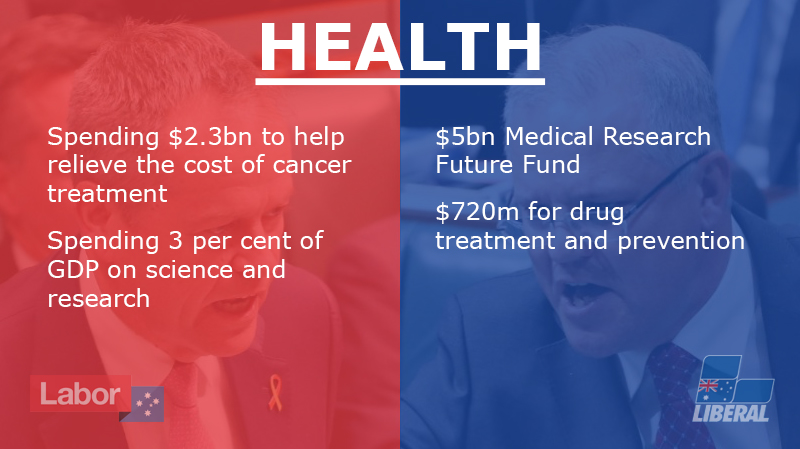No Spin: The health election promises that will affect ASX stocks

As the major parties switch up the spin cycle ahead of the May 18 federal election, we’ve hunted down the policies that will affect listed companies — so you don’t have to.
Last election it was ‘Mediscare’, this election it’s a race to see just how much each of the main parties can spend on health.
While each party’s policies are wide ranging, from regional health through to waiting lists and more money for hospitals and mental health, only a small number is likely to have much of an impact on investors

What the experts say
Morgans health analyst Scott Power says the current R&D tax incentive program has been the most efficient and effective source of funding for biotechs, and both parties are promising to keep supporting it.
This week Labor added some changes encouraging companies to work more with universities and research institutions to better facilitate the flow of research through to commercialisation.
“Both parties are putting more money to work in healthcare generally. Specifically for biotech I’m not sure there will be a direct impact given much is going into early research. ASX listed biotech companies need direct funding and I’m not sure any party is supporting this,” he said.
“From an investor sentiment prospective, Labor’s cancer funding helps the cancer focussed companies.”
The companies looking forward to a Labor cancer injection include Kazia Therapeutics (ASX:KZA) and Invitrocue (ASX:IVQ).
- Subscribe to our daily newsletter
- Join our small cap Facebook group
- Follow us on Facebook or Twitter
In-depth: The details affecting listed companies
The Liberals delivered medical research largesse via the 2019-20 federal budget, in which they promised $5bn over 10 years for the Medical Research Future Fund.
The spending will cover:
- clinical trials for rare cancers and diseases
- tackling antimicrobial resistance and drug resistant tuberculosis
- support for medical researchers inside industry and out
- a brain cancer centre
- dementia, heart, and traumatic brain industry research
- and a major spend on stem cell research announced in March
- $400m on genomics research
Australia is already a prime global location for clinical trials because of the cumulative effects of the R&D tax rebate, which made it affordable to run trials here – supporting hundreds of biotechs and turned leading hospitals into research centres as they accumulated experienced medical staff.
The Liberals are also promising $720m over four years for drug and alcohol abuse treatment and prevention.
It’s mainly focused on methamphetamine addiction, but if it started to consider opiate addiction as well that could be a winner for medical cannabis companies.
Opiate addiction is an area of research — and a key reasons for legalisation moves in the US — where marijuana is being tested successfully as a solution.
In the red corner, Labor has committed to splurging a whopping $2.3 billion on cancer.
There are two policy areas within this overarching commitment where biotechs may benefit.
- $200m is going on pathology and blood tests. Rhythm Biosciences (ASX:RHY) is one company working on a blood test for bowel cancer which, if it can commercialise it, could see some benefit in more accessible pathology.
- $125m is going on clinical trials and cancer research.
- And $600m is going on diagnostic imaging to make the various options cheaper or free. Invitrocue is looking forward to this one.
Labor is also committing to spend 3 per cent of GDP on science and research generally.
This is less of a shopping list; the party says it will re-establish ties between the government and researchers via a charter, a science and innovation council, and look into the National Science and Research priorities.
Combined with the changes to the R&D tax rebate, a greater commitment to grass-roots science could create benefits in the future for biotechs looking to commercialise cutting edge government-funded research.
UNLOCK INSIGHTS
Discover the untold stories of emerging ASX stocks.
Daily news and expert analysis, it's free to subscribe.
By proceeding, you confirm you understand that we handle personal information in accordance with our Privacy Policy.








